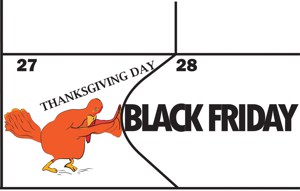Black Friday occurs the Friday after the American holiday, Thanksgiving, which is always celebrated on the fourth Thursday of November. It is viewed by many as the start of the Christmas season with major retailers offering incredible sales and vast discounts on much of their merchandise.
Origin of the Term ‘Black Friday’
 The name ‘Black Friday’ has been used in multiple contexts and dates back to the 19th century. The earliest usage refers to the financial crisis in 1869 where Jay Gould and James Fisk cornered the gold market on the New York Gold Exchange.
The name ‘Black Friday’ has been used in multiple contexts and dates back to the 19th century. The earliest usage refers to the financial crisis in 1869 where Jay Gould and James Fisk cornered the gold market on the New York Gold Exchange.
With regards to its usage as the day after Thanksgiving, the earliest usage of the word dates to 1961 where it was used in a newspaper article for The Shortsville-Manchester Enterprise. The article noted that city police used the term ‘Black Friday’ to describe the day after Thanksgiving as being an extraordinarily busy shopping day with people flooding the streets. Additionally, bus drivers were on strike at this time, which made the roads even more chaotic.
Another usage includes the ‘black ink theory’ where retailers are ‘in the black’ or in profit given the boost of sales, rather than having losses or being ‘in the red’. The earliest usage of this occurs in 1981 in the Philadelphia Inquirer.
How Did It Start?

The day after Thanksgiving has long been thought of as the official start to Christmas and is perhaps linked to the many Santa Claus parades that take place on or just after Thanksgiving with Christmas being the next major holiday to take place. Many of these parades started in the late 19th and early 20th centuries and were sponsored by stores as an advertising push for the Christmas shopping period.
One of the most popular of these parades is the Macy’s Thanksgiving Day Parade in New York, which is sponsored by the big department store, Macy’s. The store uses the parade as a way to push advertising and traditionally features Santa in his sleigh, welcoming the Christmas shopping season. There was an unspoken rule by all retailers, however, that advertising for Christmas would not begin until after the day after Thanksgiving, so as a result, that Friday became a popular shopping day driven by the start of the Christmas sales.
Retailers, however, wanted a longer shopping season, but did not want to break the tradition of advertising before Thanksgiving, so President Franklin D. Roosevelt actually moved the date of Thanksgiving a week earlier. This caused uproar and anger amongst members of the public, as holiday plans were disrupted. Many referred to this Thanksgiving as “Franksgiving” and it soon changed back to the fourth Thursday of November as per normal.
Countries That Practice Black Friday
Black Friday seems to have spread like wildfire with countries all over the world picking up on the infamous shopping day started by America.
The United States
 The United States is the birthplace of Black Friday given its placement after the American holiday, Thanksgiving. Prior to 2003, however, Black Friday was not as popular as it is today and ranked only 5th to 10th as the busiest shopping day of the year in the US from about 1993 to 2001. In those years, the busiest shopping day in America tended to always be the Saturday before Christmas. In 2003, however, Black Friday took the number one spot and seemed to retain its title as the busiest shopping day from then on out – with the exception of 2004 where it was beat out by the Saturday before Christmas.
The United States is the birthplace of Black Friday given its placement after the American holiday, Thanksgiving. Prior to 2003, however, Black Friday was not as popular as it is today and ranked only 5th to 10th as the busiest shopping day of the year in the US from about 1993 to 2001. In those years, the busiest shopping day in America tended to always be the Saturday before Christmas. In 2003, however, Black Friday took the number one spot and seemed to retain its title as the busiest shopping day from then on out – with the exception of 2004 where it was beat out by the Saturday before Christmas.
In recent years, stores within the US have opened earlier and earlier for Black Friday with many shops now opening in the early evening on Thanksgiving day. This has been given the name ‘Gray Thursday’, as shops, such as Target, Toys R Us, and Walmart, for example, open their doors from 5 – 8pm on the national holiday rather than the Friday after. ‘Gray Thursday’ has sparked outrage, however, from all parties with employees unhappy to work the holiday and consumers incensed to give up part of their holiday to competitively shop before the traditional Black Friday hours. As a result, in 2014, the sales were not particularly successful on the Thursday, so it will be interesting to see whether or not US stores will continue to open earlier on the Thursday.
The United Kingdom
Black Friday also made its way to the United Kingdom despite there being no Thanksgiving holiday for the sales to follow. Back in 2003, Curry’s did a promotion where they sold electronic devices for under £50, but things didn’t really kick off until 2013 when Asda, an American-owned British retailer, owned by the US multinational retail corporation, Walmart, started a Black Friday sale. Given the success in 2013, 2014 saw even more British retailers getting involved and 2015 will be bigger even still.
Unfortunately, however, with Black Friday also comes chaos and the UK has seen a lot of the same disorder that America experiences with reports of arguments over discounted goods and out of control crowds.
Canada
With Canadians easily crossing the border into the US to get the amazing Black Friday deals, Canadian retailers thought they also ought to compete in order to discourage their own shoppers from leaving Canada to make these purchases. Because of this, Black Friday has become one of the biggest shopping days in Canada. The deals, however, are still not quite on par to the ones offered in the US.
Other Countries
Below is a list of other countries that have also adopted Black Friday in recent years.
- Austria
- Australia
- Brazil
- Colombia
- Costa Rica
- Denmark
- France
- Germany
- India
- Lebanon
- Mexico
- Panama
- South Africa
- Sweden
- Switzerland
- Romania
